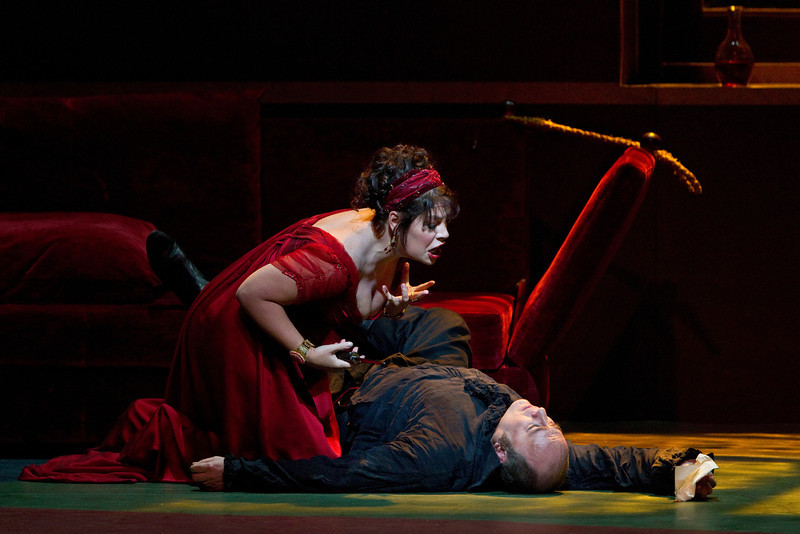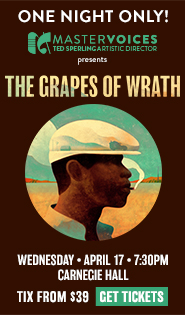Radvanovsky’s artistry raises the Met’s tacky “Tosca”
First Norma, now Tosca: That makes two drab Met productions this season that Sondra Radvanovsky has lifted up on her back and carried to roaring success.
It all starts with her acting. The soprano was surrounded in this Luc Bondy production by uninteresting sets and cheap tricks that fell well short of their intended shock value. And yet her belief in and commitment to her character’s struggle was unshaken. She was completely convincing as the doting diva in act one, showing flashes of jealousy prompted by genuine affection for her lover.
The second act was all hers, as it should be. She snarled her spoken line “Quanto?” when trying to make a deal with Scarpia, and when the proposition came she was obviously torn, wrestling at once with her pride and her devotion.
Throughout the night her voice soared with complete freedom, full, smoky, and ringing. All of this was manifest in her ravishing “Vissi d’arte,” infused with passionate grief. She nailed the B-flat at the top to the back wall of the family circle, and as she came down off of it she floated a hair-raising pianissimo on the A-flat below. The conductor Marco Armiliato was right there with her, giving her as much freedom as she wanted, and matching her level at every turn.
For his part, the Met veteran Marcello Giordani had a much tougher stepping in as Cavaradossi, following Roberto Alagna this fall. Giordani is certainly no stranger to the role, but on Wednesday night, he just didn’t have it. The Sicilian tenor was pushing heavily all the way through the first act, particularly in a clobbered “Recondita armonia” that was forceful but not especially tender. He paid for it in the third act, sounding exhausted and short of breath for “E lucevan le stelle.”
Giordani was even less convincing dramatically, acting inexplicably boorish towards the poor Sacristan (an earnest and plush-voiced John Del Carlo), even pushing him over as he knelt in prayer. He did not seem to have much more than a passing infatuation with his Tosca, and when he met his end, he staggered, stumbled, fell, and then crawled a good four or five feet on his back to find a more comfortable place to expire.
George Gagnidze, a holdover from the first cast as Scarpia, was also not in his best voice on Wednesday. The baritone did not display the same fullness of tone that he enjoyed earlier in the run, and as before he was difficult to hear when not standing right on the apron. To his credit, he did manage to position himself downstage without taking himself out of the scene, which mitigated his volume problem somewhat.
Gagnidze continued to put up a heroic struggle against this production’s shallow daub of his character. He had an arresting moment of humanity when he tried to offer comfort to a distressed Tosca, and was brusquely pushed away. He stood still, visibly wounded as she exited. And then the effigy of the virgin was rolled out, he copped a quick feel, and we were back to cringing at the creepy lech who just can’t take a hint.
It was a banner night for Marco Armiliato in the pit. He kept all of his forces in line during the Te Deum, adding no more chaos than is already written into the score. In the second act his direction was brisk and spirited, but still fleshy and richly textured. The orchestra shuddered during the torture scene, and smoldered during the rapid-fire exchanges that follow Cavaradossi’s return from the dungeon. The contemplative orchestral interlude at the top of Act 3 could have used some more velvet, but for the most part Armiliato brought out all of the drama of the conclusion, and was unashamed to tug at the heastrings by stretching out the reprise of the firing-squad’s march.
The supporting characters were generally solid with Eduardo Valdes a sniveling Spoletta, and Richard Bernstein a heroic Angelotti. Thatcher Pitkoff stood out with a pure, affecting rendition of the Shepherd’s song.
Tosca runs through December 28. metoperafamily.org
Eric C. Simpson is the Hilton Kramer Fellow in Criticism at The New Criterion




Posted Dec 18, 2013 at 4:38 am by Fernando Saraiva
Great performance and amazing debut or Ricardo Tamura at MET!